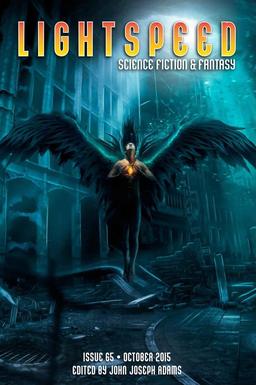Short Speculative Fiction: “Tragic Business” by Emil Ostrovski
 |
Today’s column is devoted entirely to Emil Ostrovski’s short story “Tragic Business,” published in this month’s Lightspeed. You can read it for free here. To entice you to click, behold the opening sentence:
“Once, an apple named Evan fell in love with a hummingbird, as moldy apples lying in irradiated playgrounds are sometimes wont to do.”
There now. You can’t possibly resist reading a story with that opening line, can you? At only 2,369 words, it’s brief and witty and zips by in ten minutes or less. In its surrealistic, witty logic it reminds me most of Douglas Adams’ Hitchhiker’s Guide to the Galaxy. From here I’ll delve into spoilers, so go read your Ostrovski and then come back for the full discussion.
One of the things I love most about this story is how entirely unexpected it is. Ostrovski pulls the rug out from under us in nearly every sentence. The yarn tells of the many lives lived by one soul — in an irradiated playground, a Starbucks cafe (moments before a massacre), a fair full of goldfish in plastic baggies, and a futuristic spaceship. Not to mention the liminal space wherein Evan talks to the Great Voice, who struggles ceaselessly (and with increasing irritation) to convince “souls to accept their Buddha nature.” Five settings in such a short story? Wow.
It’s not just the setting. Every line of dialogue is surprising. The story’s charm lies in how often Ostrovski moves in an unexpected direction. And yet the whole thing hangs together with remarkable consistency. If eagles show up in the third paragraph, you better believe they’ll be important to the overall plot. A beloved hummingbird is reborn as a Starbucks barista named Aidan, but there’s traces of the old life, for he has “hair like a bird’s nest.” For all the story’s random whimsy, Ostrovski works very hard to weave the motifs together, and so the story achieves a tight consistency even as it spirals in entirely unexpected directions.
The story exists within an irreverent Buddhist cosmology (“suffering is caused by attachment to the illusory world of birth and rebirth and death,” Evan impatiently explains to the Great Voice in between lives), and yet it’s fundamentally a story about romantic obsession — that most transitory of transitory attachments — and the joyous pursuit of suffering. The story disrupts any asceticism with a raw and unrelenting sexuality. Evan, for instance, decides to “sit under a tree for for days until enlightenment hit him on the head… he’d only break his meditation long enough for an occasional masturbation break.” Then, in the final moments of the story, our transcends the samsara cycle by, of all things, uploading his consciousness into a robot, after he’s consummated his love through rectal exams with a robotic nurse’s assistant, thereby breaking the cycle of rebirth. Why not? It kinda makes sense.
Black Gate covers all the major fantasy magazines. Check out the Black Gate mid-October Fantasy Magazine Rack here, and all our current magazine coverage — with updates on 30+ ongoing publications — is here.
Learned Foote’s last Short Speculative Fiction review for us was “Summer at Grandma’s House” by Hao Jingfang.
I’m a decade late here, and don’t know if you’ll see this, but thank you for the read, and the kind, thoughtful column. 🙂